Resume
Oncologist Cover Letter Examples

May 29, 2025
|
12 min read
Craft your unique oncologist cover letter with these tips, ensuring your application stands out like a beacon of hope. Showcase your dedication to healing and your passion for patient care in this vital healthcare role.
4.70 Average rating
Rated by 348 people
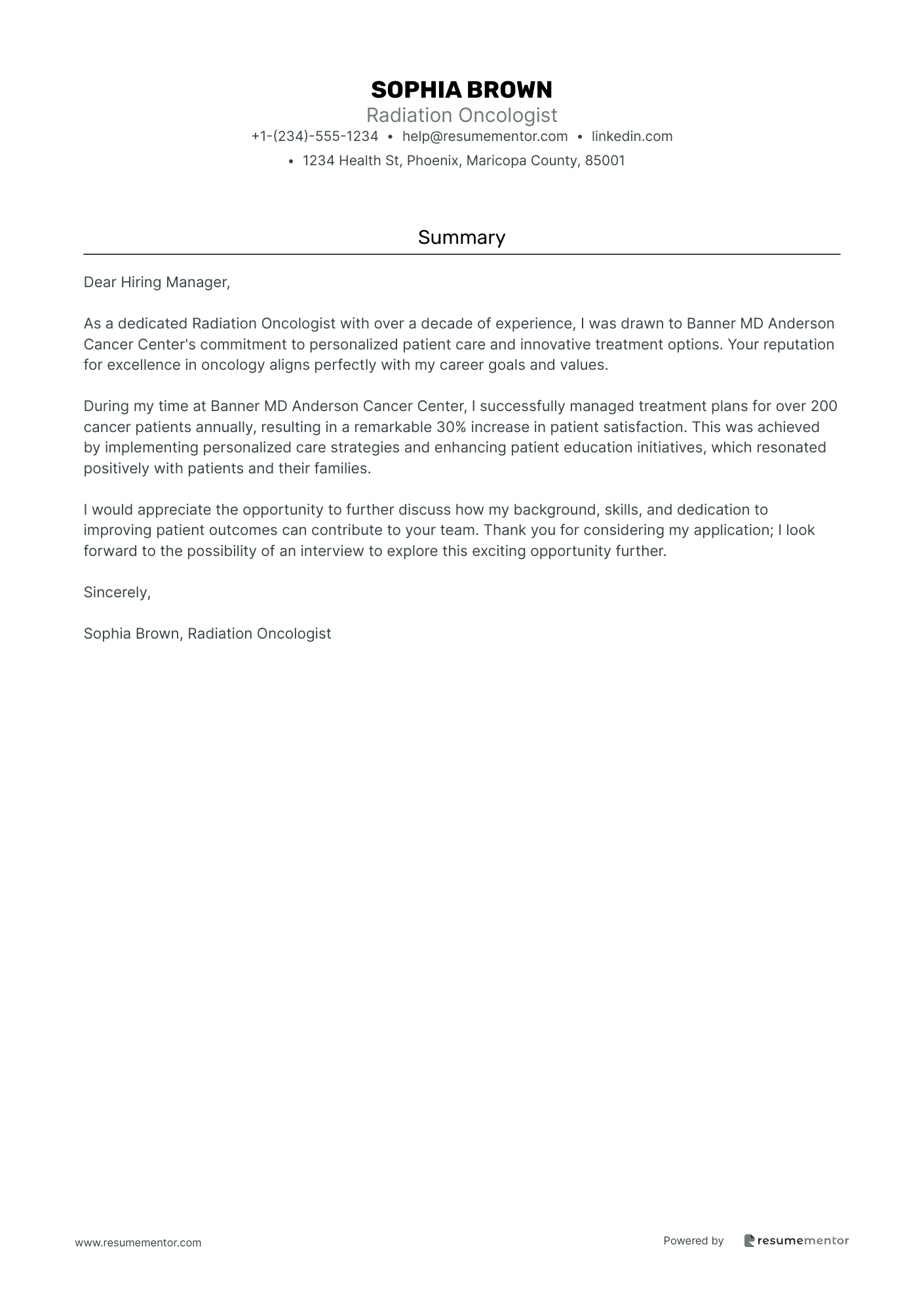
Radiation Oncologist
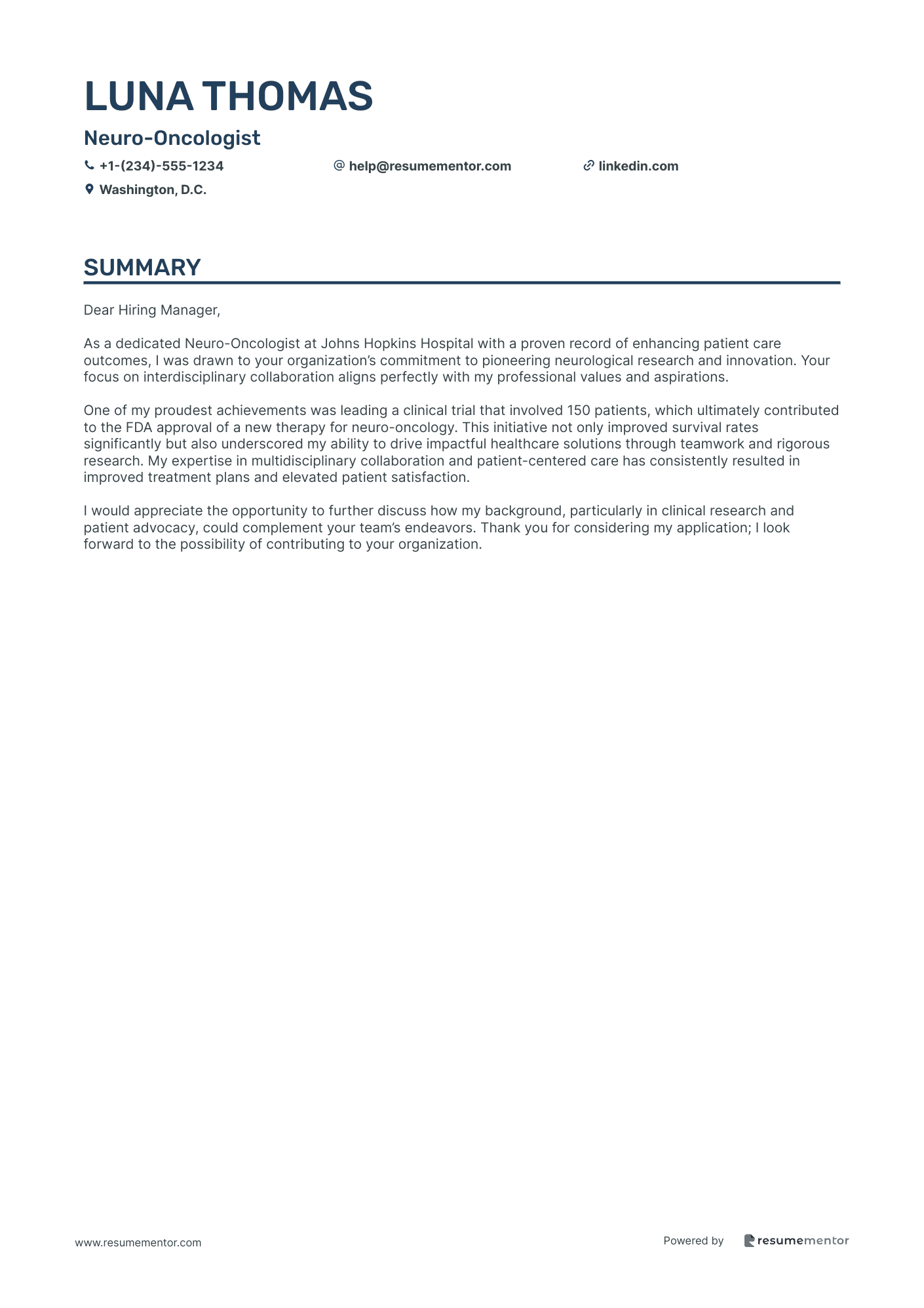
Neuro-Oncologist
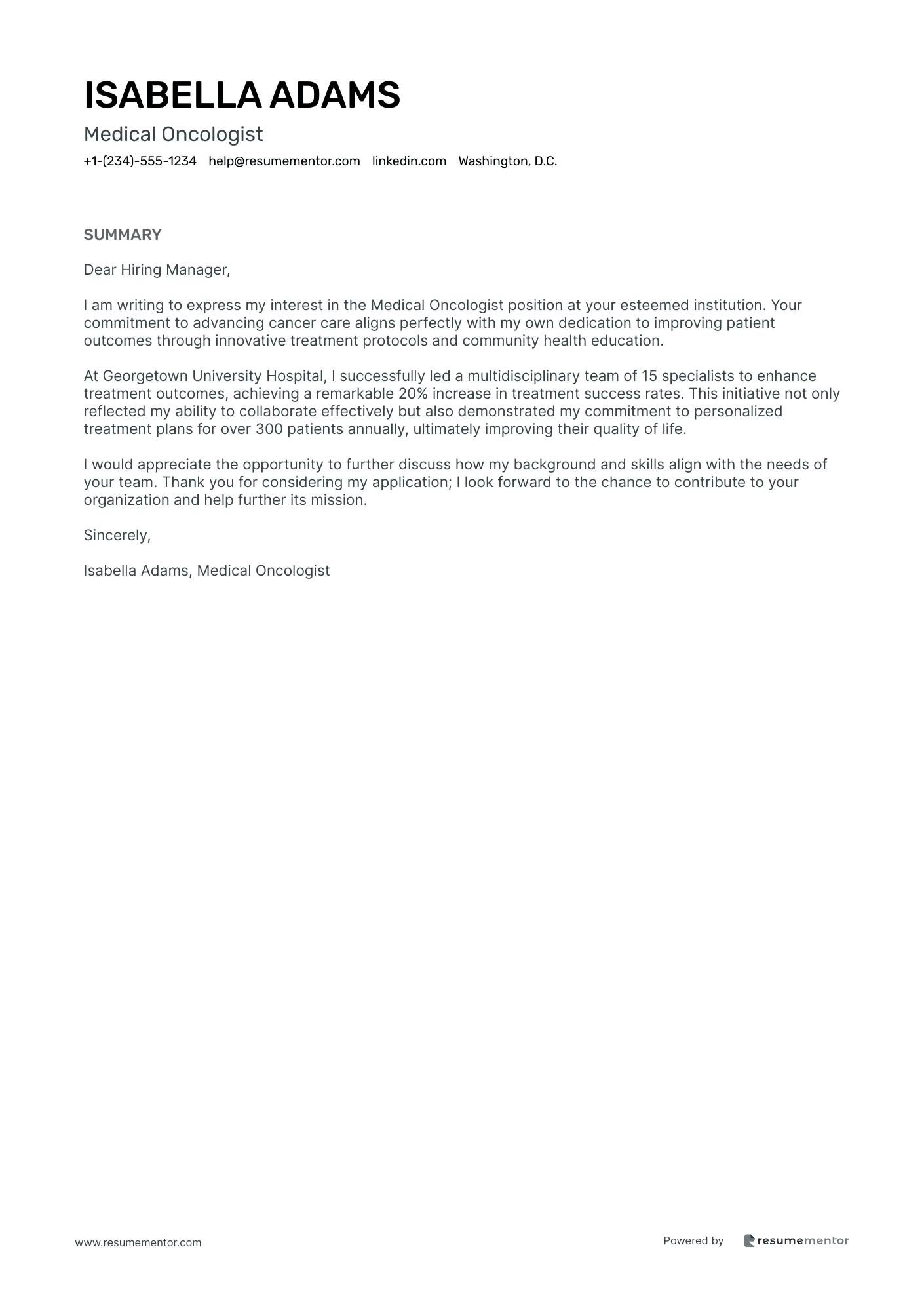
Medical Oncologist
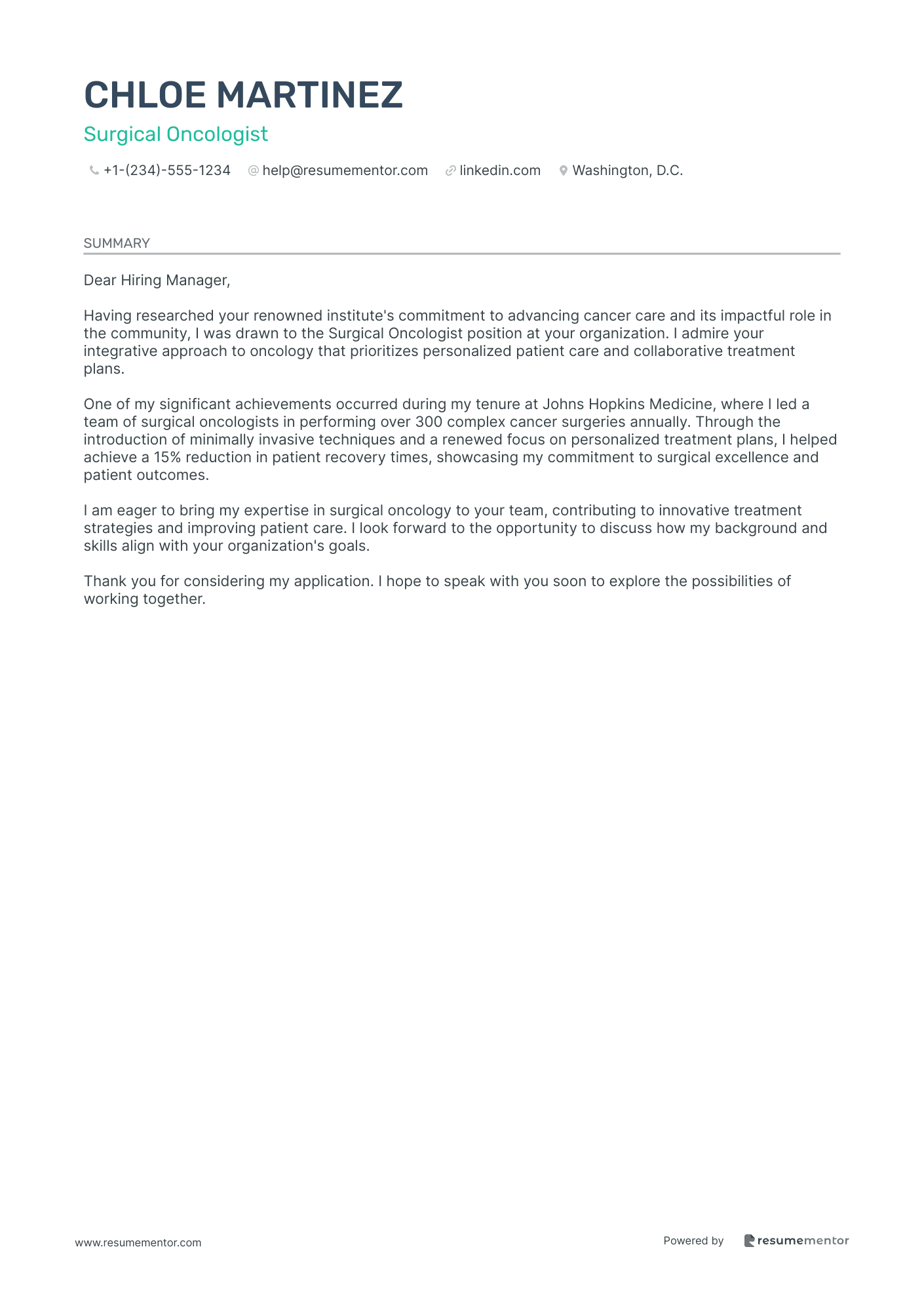
Surgical Oncologist
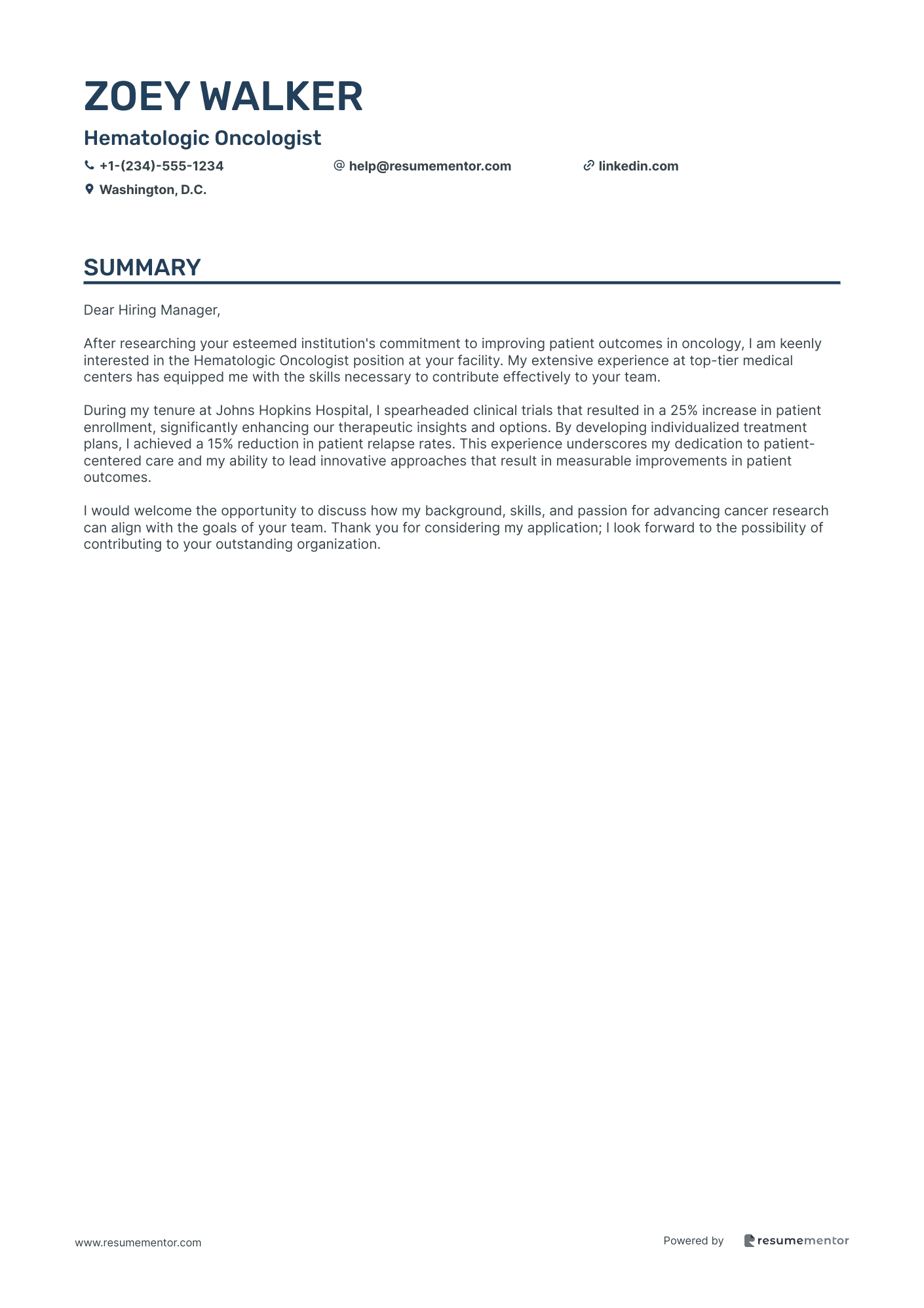
Hematologic Oncologist
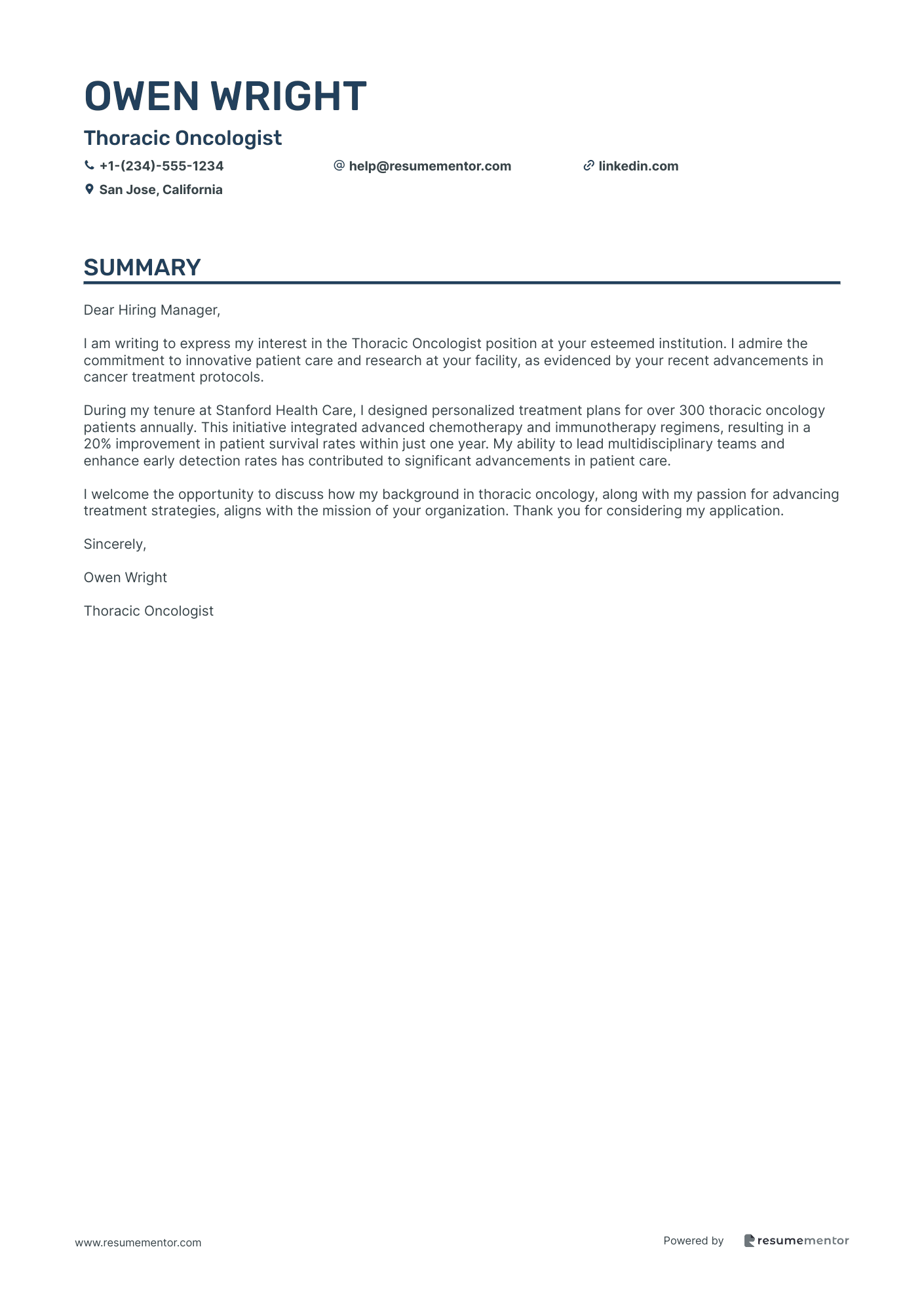
Thoracic Oncologist
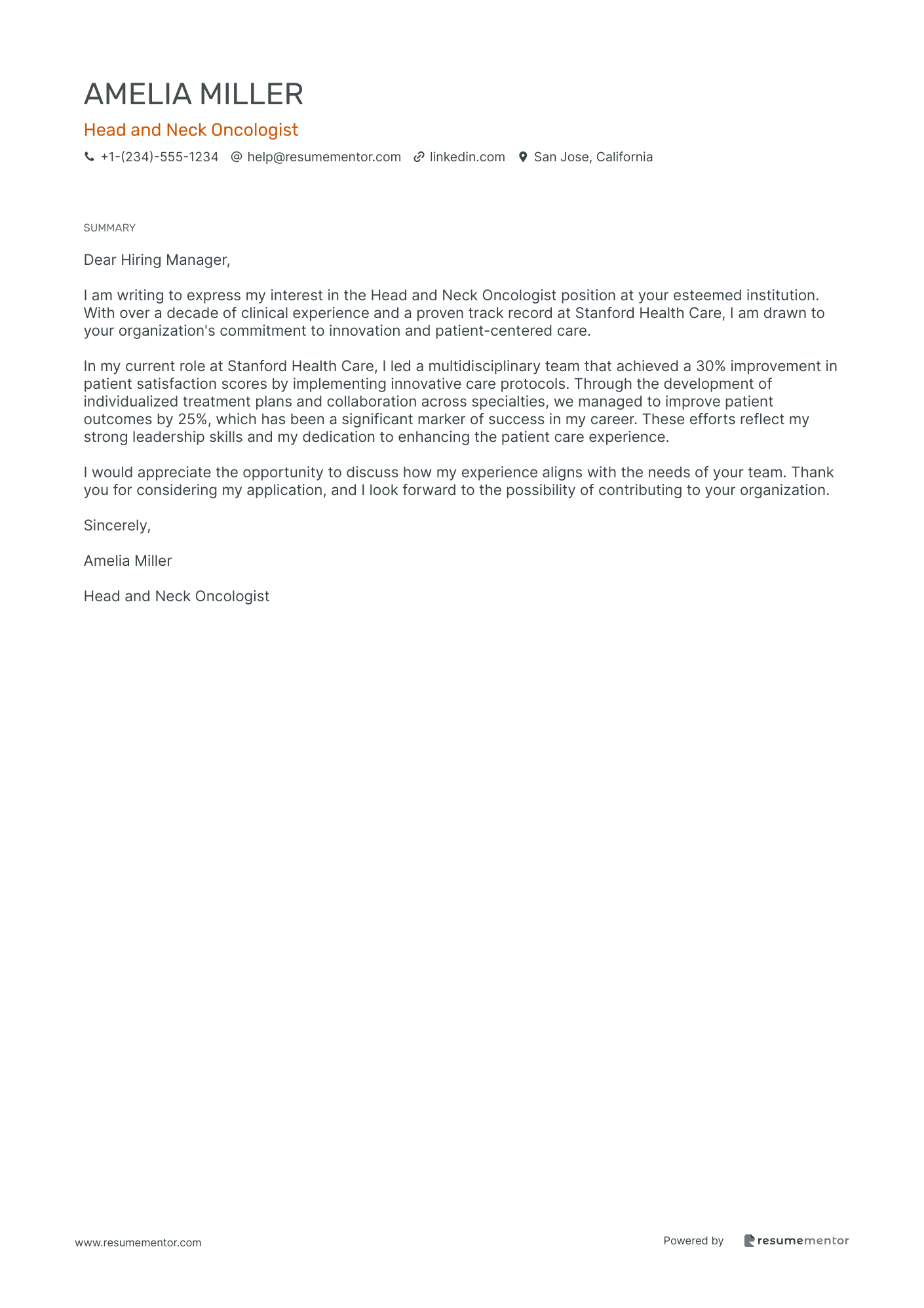
Head and Neck Oncologist
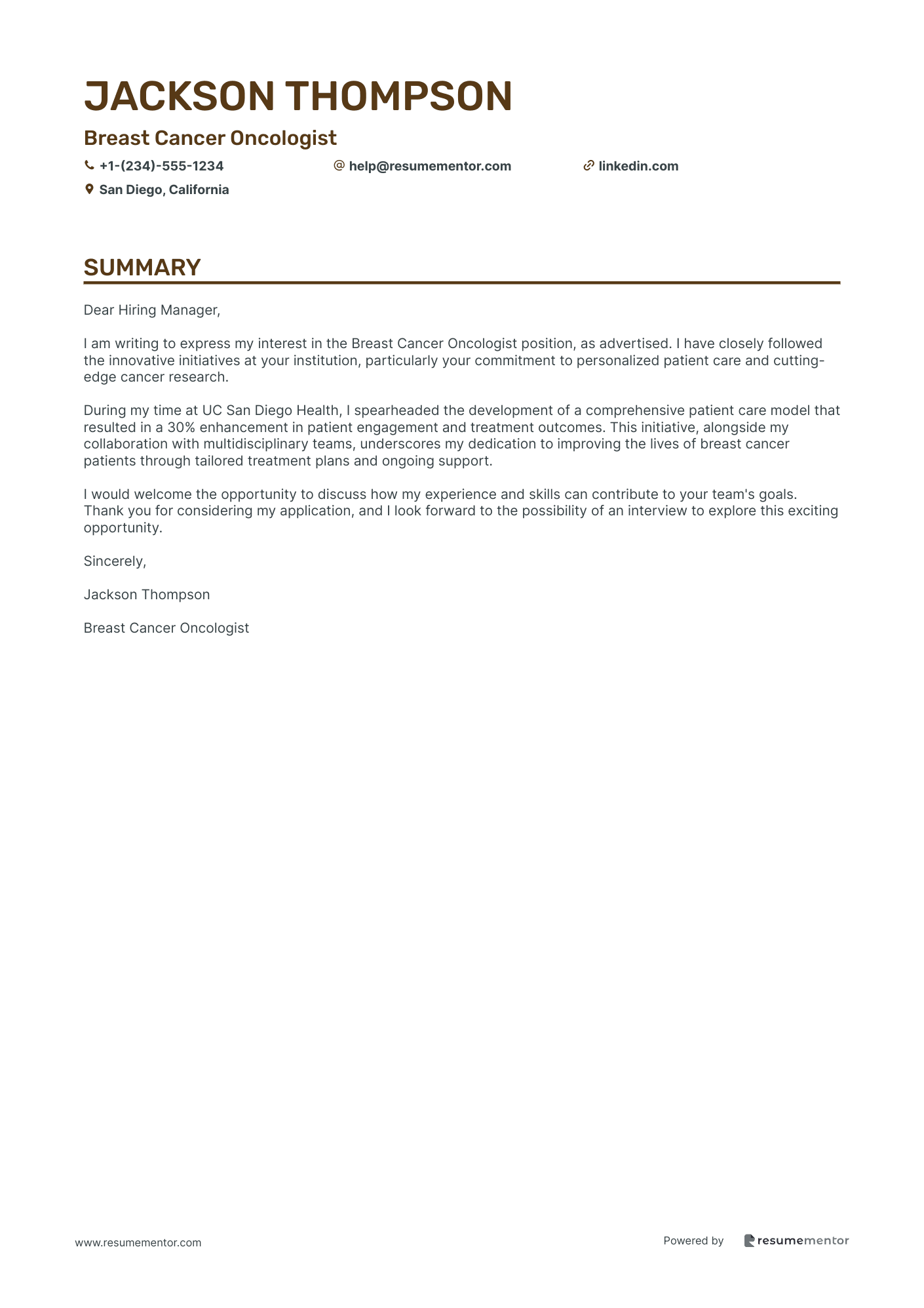
Breast Cancer Oncologist
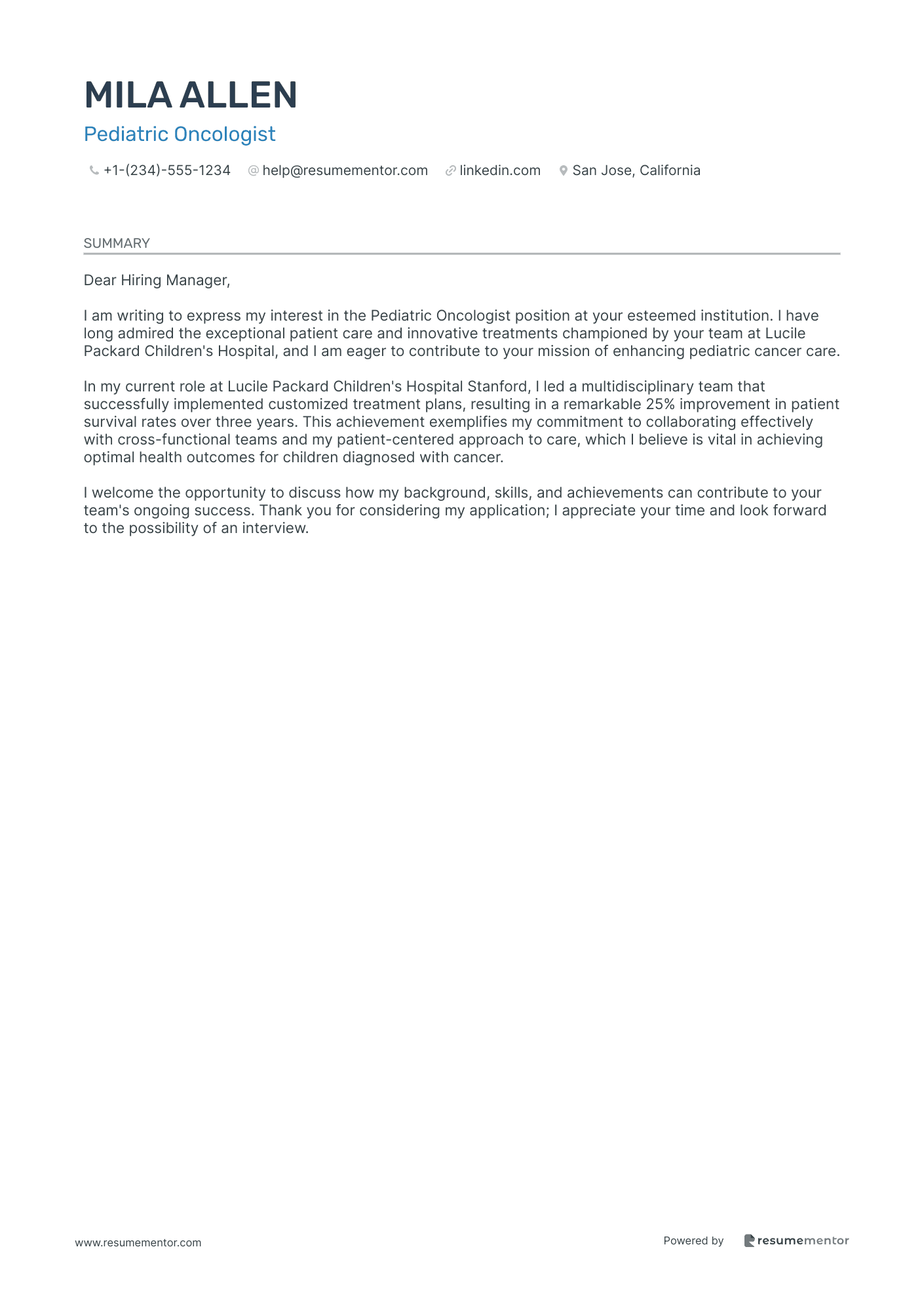
Pediatric Oncologist

Radiation Oncologist cover letter sample
When applying for this role, focus on your clinical experience, particularly with radiation therapy techniques. Highlight any specialized training you’ve received, such as in brachytherapy or image-guided radiation therapy. Mention research or projects you've been involved in, especially those that showcase your commitment to advancing treatment practices. Include metrics demonstrating your patient outcomes, like reduced side effects or improved survival rates. Use specific examples to illustrate your collaborative efforts with multidisciplinary teams, as effective communication is essential in delivering optimal patient care.
Sophia Brown
Radiation Oncologist
Summary
Dear Hiring Manager,
As a dedicated Radiation Oncologist with over a decade of experience, I was drawn to Banner MD Anderson Cancer Center's commitment to personalized patient care and innovative treatment options. Your reputation for excellence in oncology aligns perfectly with my career goals and values.
During my time at Banner MD Anderson Cancer Center, I successfully managed treatment plans for over 200 cancer patients annually, resulting in a remarkable 30% increase in patient satisfaction. This was achieved by implementing personalized care strategies and enhancing patient education initiatives, which resonated positively with patients and their families.
I would appreciate the opportunity to further discuss how my background, skills, and dedication to improving patient outcomes can contribute to your team. Thank you for considering my application; I look forward to the possibility of an interview to explore this exciting opportunity further.
Sincerely,
Sophia Brown, Radiation Oncologist
Neuro-Oncologist cover letter sample
When crafting your cover letter, emphasize your medical training and any fellowships related to the treatment of brain tumors. Highlight your experience with advanced imaging techniques, such as MRI and PET scans, as these are critical in diagnosis. Showcase your ability to work collaboratively within multidisciplinary teams to develop patient-centered treatment plans. Include details about attending relevant conferences or publishing research that demonstrates your commitment to advancing the field. Use specific patient outcomes or case studies to illustrate how your expertise has led to improved care and results.
Summary
Dear Hiring Manager,
As a dedicated Neuro-Oncologist at Johns Hopkins Hospital with a proven record of enhancing patient care outcomes, I was drawn to your organization’s commitment to pioneering neurological research and innovation. Your focus on interdisciplinary collaboration aligns perfectly with my professional values and aspirations.
One of my proudest achievements was leading a clinical trial that involved 150 patients, which ultimately contributed to the FDA approval of a new therapy for neuro-oncology. This initiative not only improved survival rates significantly but also underscored my ability to drive impactful healthcare solutions through teamwork and rigorous research. My expertise in multidisciplinary collaboration and patient-centered care has consistently resulted in improved treatment plans and elevated patient satisfaction.
I would appreciate the opportunity to further discuss how my background, particularly in clinical research and patient advocacy, could complement your team’s endeavors. Thank you for considering my application; I look forward to the possibility of contributing to your organization.
Medical Oncologist cover letter sample
When applying for this position, it’s essential to showcase your clinical experience in oncology, emphasizing any specialized training in chemotherapy, immunotherapy, or radiation. Highlight your ability to communicate complex medical information clearly to patients and families. Include any involvement in clinical trials or research projects, as this demonstrates your commitment to advancing cancer care. Additionally, offer specific examples of how you've improved patient outcomes through personalized treatment plans, using the 'skill-action-result' framework to illustrate your impact in previous roles.
Summary
Dear Hiring Manager,
I am writing to express my interest in the Medical Oncologist position at your esteemed institution. Your commitment to advancing cancer care aligns perfectly with my own dedication to improving patient outcomes through innovative treatment protocols and community health education.
At Georgetown University Hospital, I successfully led a multidisciplinary team of 15 specialists to enhance treatment outcomes, achieving a remarkable 20% increase in treatment success rates. This initiative not only reflected my ability to collaborate effectively but also demonstrated my commitment to personalized treatment plans for over 300 patients annually, ultimately improving their quality of life.
I would appreciate the opportunity to further discuss how my background and skills align with the needs of your team. Thank you for considering my application; I look forward to the chance to contribute to your organization and help further its mission.
Sincerely,
Isabella Adams, Medical Oncologist
Surgical Oncologist cover letter sample
When applying for this position, emphasize any clinical experience in oncology and familiarity with surgical procedures. Highlight your proficiency in patient evaluation and treatment planning, as these are critical components. Mention any relevant fellowships or advanced training that showcase your expertise. It’s also important to discuss your experience with multidisciplinary teams and how collaboration has improved patient outcomes. Provide specific instances where your clinical decisions led to positive results for patients, using the 'skill-action-result' method to illustrate your impact.
Summary
Dear Hiring Manager,
Having researched your renowned institute's commitment to advancing cancer care and its impactful role in the community, I was drawn to the Surgical Oncologist position at your organization. I admire your integrative approach to oncology that prioritizes personalized patient care and collaborative treatment plans.
One of my significant achievements occurred during my tenure at Johns Hopkins Medicine, where I led a team of surgical oncologists in performing over 300 complex cancer surgeries annually. Through the introduction of minimally invasive techniques and a renewed focus on personalized treatment plans, I helped achieve a 15% reduction in patient recovery times, showcasing my commitment to surgical excellence and patient outcomes.
I am eager to bring my expertise in surgical oncology to your team, contributing to innovative treatment strategies and improving patient care. I look forward to the opportunity to discuss how my background and skills align with your organization's goals.
Thank you for considering my application. I hope to speak with you soon to explore the possibilities of working together.
Hematologic Oncologist cover letter sample
When applying for this position, emphasize any clinical experience in treating blood cancers. Highlight your expertise in interpreting laboratory results and developing treatment plans tailored to individual patients. Showcase your familiarity with the latest therapies, including immunotherapy and targeted treatments. If you have participated in clinical trials or research, make sure to mention these contributions. Providing examples of how your interventions have positively impacted patient outcomes can strengthen your application. Use a 'skill-action-result' framework to clearly articulate your achievements in previous roles.
Summary
Dear Hiring Manager,
After researching your esteemed institution's commitment to improving patient outcomes in oncology, I am keenly interested in the Hematologic Oncologist position at your facility. My extensive experience at top-tier medical centers has equipped me with the skills necessary to contribute effectively to your team.
During my tenure at Johns Hopkins Hospital, I spearheaded clinical trials that resulted in a 25% increase in patient enrollment, significantly enhancing our therapeutic insights and options. By developing individualized treatment plans, I achieved a 15% reduction in patient relapse rates. This experience underscores my dedication to patient-centered care and my ability to lead innovative approaches that result in measurable improvements in patient outcomes.
I would welcome the opportunity to discuss how my background, skills, and passion for advancing cancer research can align with the goals of your team. Thank you for considering my application; I look forward to the possibility of contributing to your outstanding organization.
Thoracic Oncologist cover letter sample
In your cover letter, emphasize your clinical experience, particularly in diagnosing and treating lung cancer and other thoracic malignancies. Highlight your familiarity with treatment modalities, such as chemotherapy, immunotherapy, and radiation therapy. Mention any research contributions or publications relevant to thoracic oncology. Discuss your collaboration with multidisciplinary teams, showcasing your ability to coordinate care effectively. Include any certifications or fellowships relevant to the field. Use the STAR method to present specific instances where your expertise improved patient outcomes or clinical processes.
Owen Wright
Thoracic Oncologist
Summary
Dear Hiring Manager,
I am writing to express my interest in the Thoracic Oncologist position at your esteemed institution. I admire the commitment to innovative patient care and research at your facility, as evidenced by your recent advancements in cancer treatment protocols.
During my tenure at Stanford Health Care, I designed personalized treatment plans for over 300 thoracic oncology patients annually. This initiative integrated advanced chemotherapy and immunotherapy regimens, resulting in a 20% improvement in patient survival rates within just one year. My ability to lead multidisciplinary teams and enhance early detection rates has contributed to significant advancements in patient care.
I welcome the opportunity to discuss how my background in thoracic oncology, along with my passion for advancing treatment strategies, aligns with the mission of your organization. Thank you for considering my application.
Sincerely,
Owen Wright
Thoracic Oncologist
Head and Neck Oncologist cover letter sample
When crafting your cover letter, focus on your specialized training and fellowships in head and neck oncology. Highlight your experience with complex surgical procedures and any innovative treatments you have implemented. If you’ve contributed to research or published papers in this field, include those to show your commitment to advancing care. Emphasize your collaboration with multidisciplinary teams to improve patient outcomes. Provide specific examples of how your interventions have led to increased survival rates or enhanced quality of life for patients.
Amelia Miller
Head and Neck Oncologist
Summary
Dear Hiring Manager,
I am writing to express my interest in the Head and Neck Oncologist position at your esteemed institution. With over a decade of clinical experience and a proven track record at Stanford Health Care, I am drawn to your organization's commitment to innovation and patient-centered care.
In my current role at Stanford Health Care, I led a multidisciplinary team that achieved a 30% improvement in patient satisfaction scores by implementing innovative care protocols. Through the development of individualized treatment plans and collaboration across specialties, we managed to improve patient outcomes by 25%, which has been a significant marker of success in my career. These efforts reflect my strong leadership skills and my dedication to enhancing the patient care experience.
I would appreciate the opportunity to discuss how my experience aligns with the needs of your team. Thank you for considering my application, and I look forward to the possibility of contributing to your organization.
Sincerely,
Amelia Miller
Head and Neck Oncologist
Breast Cancer Oncologist cover letter sample
When applying for this role, it's important to showcase your clinical experience in oncology and any specific training in breast cancer treatment. Highlight your familiarity with the latest research and treatment protocols, including targeted therapies and immunotherapy options. Demonstrating your strong collaboration skills with multidisciplinary teams is crucial, as is your ability to communicate complex medical information to patients and their families. Use a 'skill-action-result' format to share patient outcomes or improvements in care you've facilitated.
Jackson Thompson
Breast Cancer Oncologist
Summary
Dear Hiring Manager,
I am writing to express my interest in the Breast Cancer Oncologist position, as advertised. I have closely followed the innovative initiatives at your institution, particularly your commitment to personalized patient care and cutting-edge cancer research.
During my time at UC San Diego Health, I spearheaded the development of a comprehensive patient care model that resulted in a 30% enhancement in patient engagement and treatment outcomes. This initiative, alongside my collaboration with multidisciplinary teams, underscores my dedication to improving the lives of breast cancer patients through tailored treatment plans and ongoing support.
I would welcome the opportunity to discuss how my experience and skills can contribute to your team's goals. Thank you for considering my application, and I look forward to the possibility of an interview to explore this exciting opportunity.
Sincerely,
Jackson Thompson
Breast Cancer Oncologist
Pediatric Oncologist cover letter sample
When applying for this role, it's important to emphasize your clinical experience in treating pediatric patients, particularly those with cancer. Highlight any specialized training, such as fellowships or rotations in oncology. Showcase your ability to work as part of a multidisciplinary team, mentioning collaborations with nurses, social workers, and other specialists. Include any research on pediatric oncology that you've contributed to, along with publications. Use specific examples to demonstrate your patient communication skills and how you've supported families during difficult times, showing empathy and care.
Mila Allen
Pediatric Oncologist
Summary
Dear Hiring Manager,
I am writing to express my interest in the Pediatric Oncologist position at your esteemed institution. I have long admired the exceptional patient care and innovative treatments championed by your team at Lucile Packard Children's Hospital, and I am eager to contribute to your mission of enhancing pediatric cancer care.
In my current role at Lucile Packard Children's Hospital Stanford, I led a multidisciplinary team that successfully implemented customized treatment plans, resulting in a remarkable 25% improvement in patient survival rates over three years. This achievement exemplifies my commitment to collaborating effectively with cross-functional teams and my patient-centered approach to care, which I believe is vital in achieving optimal health outcomes for children diagnosed with cancer.
I welcome the opportunity to discuss how my background, skills, and achievements can contribute to your team's ongoing success. Thank you for considering my application; I appreciate your time and look forward to the possibility of an interview.
Related Articles

Continue Reading
Check more recommended readings to get the job of your dreams.
Resume
Resources
Tools
© 2026. All rights reserved.
Made with love by people who care.
